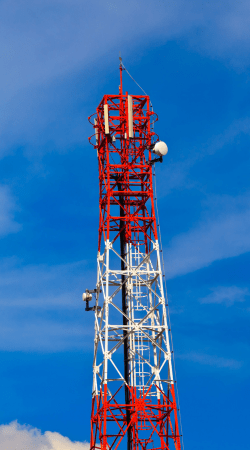- +91-11-4044-5999
- info@cdri.world
-
Copernicus Marg, New Delhi, INDIA

In a largely networked world, telecommunications are a ‘lifeline Infrastructure system,’ given the dependency of modern day living on telecom-based services. Telecommunications is equally crucial in the operation of other infrastructures such as airports, management of power grids and operation of banking services, to name a few. The sector is transforming with the advent of emerging technologies and innovations such as 5G, high-speed, and low latency broadband satellite-based internet. With increasing investments, there is a need to promote principles of resilience within this infrastructure sector to present and future shocks.
Moreover, data centres are pivotal components within the Information, Communication and Technology (ICT) infrastructure systems. Data centres consist of computing equipment, storage and network, and given the rising trends of hurricanes, floods, wildfires etc., the ability of data centres to stay operational under all circumstances is challenged.
Keeping the criticality of this sector in mind, CDRI aims to enhance the disaster resilience of the telecommunications sector through:
-
A study on National and subnational disaster risk and resilience assessment and roadmap for telecommunication sector, India, and for three CDRI Member Countries, will be undertaken. This will include the development of a comprehensive Disaster Risk and Resilience Assessment Framework (DRRAF) and an Actionable Roadmap for resilient telecommunication sector for the selected geographies. Under the scope of this study, disasters caused either by rapid or slow onset events which may be geophysical, hydrological, climatological and meteorological will be considered.
-
To lead global thinking and action on DRI, the Coalition commissioned a special issue publication focusing on disaster and climate resilient infrastructure, complemented by an international technical conference, on the theme of ‘Adaptive Pathways for Resilient Infrastructure.’
-
The Special Issue Publication presents cutting-edge research on challenges and solutions in relation to infrastructure planning, technology and innovation, risk financing, risk governance, project implementation, operation and maintenance, based on the experiences of the pandemic; along with identifying, updating and consolidating critical knowledge and innovation for resilient infrastructure for policy makers and practitioners.
-
DRI Technical Conference brought together experts and participants from various countries and organizations, based on their critical roles in building disaster and climate resilient infrastructure. The objective was to critically assess and evaluate ongoing research in disaster and climate resilient infrastructure and identifying avenues for future research; obtain consolidated and updated knowledge trends on disaster and climate resilient infrastructure; promote collaboration and networking between world renowned researchers and practitioners; and develop a publication of indexed conference proceedings/ book of abstracts.